Any use of music in the films embedded on this blog complies with 'Fair Dealing' under the 1988 Copyright Designs and Patents Act (UK), Sections 6(i) and 6(ii); Fair dealing is a term used to describe some limited activities that are allowed without infringing copyright. Briefly these are as follows:
Section 6i).
Research and private study
Copying parts of a literary, dramatic, musical or artistic work or of a typographical arrangement of a published edition for the purpose of research or private study is allowed under the following conditions:
· The copy is made for the purposes of research or private study.
· The copy is made for non-commercial purposes.
· The source of the material is acknowledged.
· The person making the copy does not make copies of the material available for a number of people.
ii) Instruction or examination
Copying parts of a literary, dramatic, musical or artistic work or a sound recording, film or broadcast for the purpose of instruction or examination is allowed under the following conditions:
· The copying is done by the student or the person giving instruction.
· The copying is not done via a reprographic process.
· The source of the material is acknowledged.
· The instruction is for a non-commercial purpose.
Our main influence for the opening sequence for our production was from the film 'Kidulthood'. We also looked at TV series on Channel 4 such as 'Skins' and 'Shameless' when considering characters and an appropriate content for the plot and storyline. Kidutlhood is also from the genre of social realist drama, and looks at youth culture and crime in a British society, making it relatable to by a UK audience as they understand and are aware of similar stereotypes and things happening in there own areas. We chose to use this as a starting point for our own production as it also tackled the stereotypes surrounding 'chavs', gangs and youth culture as well as also being centred predominantly around knife crime and the negative impacts of gang culture. For the similarities with the issues we wanted to look at in our own film, we thought this was the perfect film to look at for research to study codes and conventions of social realist drama and also the way stereotypes and character profiles are built.
We tried to convey the idea that the male who is stereotyped feels the need to carry a knife with him as either a safety blanket or because he has been socialized through labelling theory through the media to believe that this is what is necessary for him to survive on a day to day basis. The knife has become an object of security and power and like the girl, who is meant to represent the opposite character to ‘chav’, they both cherish different objects for security. For the female the most important objects in her life are her make up and phone and for the male, the knife is vital in his every day life as he feels safe with it.
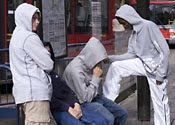 We created his stereotype through dress codes as a 'Chav' wearing a hoody, the location of his house and the urbanised area surrounding it and effectively the fact he is male also plays a part in this stereotype as the media generally tends to look at gang crime amongst young males rather than females. The fact he is a male also shows his dominance as hegomonic masculinity is the dominant ideology within our British society and therefore he seems to have more power than if he had been a girl, which is also excerted through the knife. For this reason i feel that we have used appropriate stereotypes, following the codes and conventions of the social realist drama genre, to allow the audience to make assumptions about the characters, so that they were relatable and instantly recognisable to a wide audience, but are trying to challenge the stereotype of ‘Chav’ to show that maybe people in a similar situation to this character turn to knifes simply as a way of feeling safe due to the media’s construction and negative image of lower class, urbanised areas, creating a self fulfilling prophecy as people from these deprived areas then feel that everyone else is carry knifes and therefore it would be unsafe for them not to.
We created his stereotype through dress codes as a 'Chav' wearing a hoody, the location of his house and the urbanised area surrounding it and effectively the fact he is male also plays a part in this stereotype as the media generally tends to look at gang crime amongst young males rather than females. The fact he is a male also shows his dominance as hegomonic masculinity is the dominant ideology within our British society and therefore he seems to have more power than if he had been a girl, which is also excerted through the knife. For this reason i feel that we have used appropriate stereotypes, following the codes and conventions of the social realist drama genre, to allow the audience to make assumptions about the characters, so that they were relatable and instantly recognisable to a wide audience, but are trying to challenge the stereotype of ‘Chav’ to show that maybe people in a similar situation to this character turn to knifes simply as a way of feeling safe due to the media’s construction and negative image of lower class, urbanised areas, creating a self fulfilling prophecy as people from these deprived areas then feel that everyone else is carry knifes and therefore it would be unsafe for them not to.
For this reason I think that our production could be aimed at a wide audience as the stereotype of ‘chav’ is understood and is a firmly established ideology within both the lower and middle classes due to the media’s mass focus on youth and knife crime, specifically from council estates and urbanised deprived areas of cities and large towns.
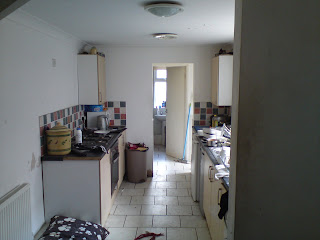 For this reason the location that we chose for where the male lived, was the urbanised, terraced housed area of Weymouth near the Train station called the Park District. This is a fairly run down area of the town and is over crowded and the male's house we chose to film in was also fairly worn and un-looked after which added to the character and the stereotype. I think that the age group that our product would attract most is people aged 16-25 as this very much is an issue that may be affecting their lives and therefore are the age group most likely to be able to relate to the characters, plot, story line and to understand the characters feelings and priorities. This has been previously done before in programs such as skins and shameless, showing real life problems and every day encounters that teenagers and young adults experience and trying to make them more understood by both other teenagers and adults. For example in ‘Skins’ the party culture and drug culture are massively represented in an exaggerated way, that allows teenagers to relate to the characters and feel included in the drama production.
For this reason the location that we chose for where the male lived, was the urbanised, terraced housed area of Weymouth near the Train station called the Park District. This is a fairly run down area of the town and is over crowded and the male's house we chose to film in was also fairly worn and un-looked after which added to the character and the stereotype. I think that the age group that our product would attract most is people aged 16-25 as this very much is an issue that may be affecting their lives and therefore are the age group most likely to be able to relate to the characters, plot, story line and to understand the characters feelings and priorities. This has been previously done before in programs such as skins and shameless, showing real life problems and every day encounters that teenagers and young adults experience and trying to make them more understood by both other teenagers and adults. For example in ‘Skins’ the party culture and drug culture are massively represented in an exaggerated way, that allows teenagers to relate to the characters and feel included in the drama production.
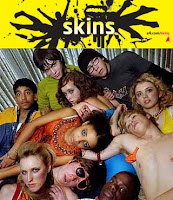 I therefore think that our production would be aired on channel 4, past the watershed of 9pm so that a more accurate stereotype and representation of youth’s could be shown, surrounding the issues of knife crime. I also think that there is a gap in the market as other drama productions aimed at a similar age group and audience focus on mainly issues surrounding drugs and alcohol consumption, such as 'Skins' and 'Shameless' which are also aimed at a similar age group and aired at 10pm on different nights, and therefore I think that ‘Ranelagh Road’ would fit in well with helping society understand more about knife crime and the reasons why people may turn to it.
I therefore think that our production would be aired on channel 4, past the watershed of 9pm so that a more accurate stereotype and representation of youth’s could be shown, surrounding the issues of knife crime. I also think that there is a gap in the market as other drama productions aimed at a similar age group and audience focus on mainly issues surrounding drugs and alcohol consumption, such as 'Skins' and 'Shameless' which are also aimed at a similar age group and aired at 10pm on different nights, and therefore I think that ‘Ranelagh Road’ would fit in well with helping society understand more about knife crime and the reasons why people may turn to it.
 From the production of this product I have become a lot more confident in my own abilities at creating a well constructed product that follows the codes and conventions of the genre its from. I feel that I have learnt a lot more about camera work and filming as well as the importance of tight and relevant editing as when we first put some of our shots together they didn’t quite fit or make sense and as a group we were able to acknowledge this and were not worried about changing the shots and really cutting them down. For this reason I am also more confident using the editing software Movie Maker which I have previously used before for GCSE productions as well as the preliminary exercise. I feel I have also learnt the basics of the more complex editor, Premier, as we used this to add in the title over our film and also to make the fade ins flow better and more smoothly.
From the production of this product I have become a lot more confident in my own abilities at creating a well constructed product that follows the codes and conventions of the genre its from. I feel that I have learnt a lot more about camera work and filming as well as the importance of tight and relevant editing as when we first put some of our shots together they didn’t quite fit or make sense and as a group we were able to acknowledge this and were not worried about changing the shots and really cutting them down. For this reason I am also more confident using the editing software Movie Maker which I have previously used before for GCSE productions as well as the preliminary exercise. I feel I have also learnt the basics of the more complex editor, Premier, as we used this to add in the title over our film and also to make the fade ins flow better and more smoothly.  The one issue that I think was most negatively effecting was the decision before filming that we were going to play music over the film to enhance the 'Chav' stereotype as this meant when filming we didn't take into consideration sound as much as we should have in all shots. This has been edited and now i feel it works fairly well as the music helps to introduce the characters as we didn't plan on having any dialogue in the first place. We then also decided the best place to cut the music was where they left the houses, as a way of indicating the film is properly starting and the opening credits are over. We therefore faded from music into diagetic ambient sounds. There was a small problem that we found which was that as we filmed the last scene of Jamie walking across the road, there was a lot of people near and around us and therefore you can here people talking on the film so we used Premier to take reduce the volume in the sound at the parts where the speech is heard. We also replicated the sound in Adobe Audition 1.5, of the door slamming and then made it echo and fade out to create a sound bridge between the two final shots as this helps the film flow better.
The one issue that I think was most negatively effecting was the decision before filming that we were going to play music over the film to enhance the 'Chav' stereotype as this meant when filming we didn't take into consideration sound as much as we should have in all shots. This has been edited and now i feel it works fairly well as the music helps to introduce the characters as we didn't plan on having any dialogue in the first place. We then also decided the best place to cut the music was where they left the houses, as a way of indicating the film is properly starting and the opening credits are over. We therefore faded from music into diagetic ambient sounds. There was a small problem that we found which was that as we filmed the last scene of Jamie walking across the road, there was a lot of people near and around us and therefore you can here people talking on the film so we used Premier to take reduce the volume in the sound at the parts where the speech is heard. We also replicated the sound in Adobe Audition 1.5, of the door slamming and then made it echo and fade out to create a sound bridge between the two final shots as this helps the film flow better.
 I also feel that I understand the codes and conventions and the importance of stereotypes in more depth as we have had to use them to make our product instantly relatable, as the task was to create an opening sequence to a film and therefore establishing firmly the characters through ideologies and stereotypes is vital in the first few minutes and I feel we have also done this very well as a group. The stereotypes we chose of 'Chav' and 'Girly Girl', which firstly are very opposite in both appearance and attitude are also very easily recognised within our British culture which meant it was also very easy to form the dress codes for these characters and deciding on the objects and setting that they would interact with. If we had gotten our characters to simply wear 'normal' clothes and be in average houses the same effect would not have been made and assumptions about the characters would have been hard to make from the audiences point of view and therefore i think we have been successful in our stereotyping as it immediately gives the film a starting point and gives the audience an idea about the direction the sequence of events may take.
I also feel that I understand the codes and conventions and the importance of stereotypes in more depth as we have had to use them to make our product instantly relatable, as the task was to create an opening sequence to a film and therefore establishing firmly the characters through ideologies and stereotypes is vital in the first few minutes and I feel we have also done this very well as a group. The stereotypes we chose of 'Chav' and 'Girly Girl', which firstly are very opposite in both appearance and attitude are also very easily recognised within our British culture which meant it was also very easy to form the dress codes for these characters and deciding on the objects and setting that they would interact with. If we had gotten our characters to simply wear 'normal' clothes and be in average houses the same effect would not have been made and assumptions about the characters would have been hard to make from the audiences point of view and therefore i think we have been successful in our stereotyping as it immediately gives the film a starting point and gives the audience an idea about the direction the sequence of events may take.
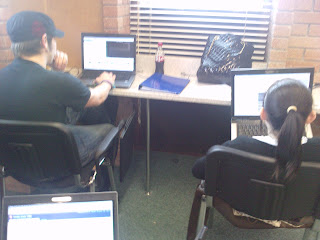 I have found the main task filming and editing in general was lengthier and more detailed than the preliminary exercise and therefore I feel that we have also put more effort into it, sticking more strictly to the script and storyboard and changing things where necessary to gain a better and more professional effect and to make the shot sequences more complex to show off our ability as well as helping to emphasise the characters and their stereotypes. We also took more care in ensuring we took as many takes as possible of each shot and also repeated the same action from different angles so that they could either be edited together like as shown in the scene where the knife is taken from the drawer, or so that we were able to see which looked better once put into the whole sequence of shots. As a group we were more organised and confident with the equipment and overall have worked well as a group. We were also more flexible with the shots we took, adding more complex shots and sequence of shots into our storyboard as we felt more able to achieve them after completing the preliminary exercise.
I have found the main task filming and editing in general was lengthier and more detailed than the preliminary exercise and therefore I feel that we have also put more effort into it, sticking more strictly to the script and storyboard and changing things where necessary to gain a better and more professional effect and to make the shot sequences more complex to show off our ability as well as helping to emphasise the characters and their stereotypes. We also took more care in ensuring we took as many takes as possible of each shot and also repeated the same action from different angles so that they could either be edited together like as shown in the scene where the knife is taken from the drawer, or so that we were able to see which looked better once put into the whole sequence of shots. As a group we were more organised and confident with the equipment and overall have worked well as a group. We were also more flexible with the shots we took, adding more complex shots and sequence of shots into our storyboard as we felt more able to achieve them after completing the preliminary exercise.
The use of music was a major part of our production as we wanted the music to be fitting for both characters, even though they are from different social classes and backgrounds. However recently the music scene has vastly grown and widened and therefore it is not unusual for a middle class girl to be listening to rap, grime or bass music as many genres have merged and become much more main stream in recent years. We used a CD from the library collection as it enabled us to have all the copyright information necessary to be able to include the track in our production. We chose to bring the music in firstly diegetically, to show that the character of the girl, who may be more unlikely to listen to this style of music, has chosen to play this song through her iPod.
 When the next shot of the ‘chav’ then appears the music becomes non-diegetic and therefore merges into the introduction of both characters and is the only similarity that links the characters in a firmly established way that is visible to the audience from the start. We felt that this also helps to indicate that at some point in the storyline these characters are going to meet and that there is going to be a clash, but it leaves it a mystery as to what happens and whether the clash is good or not, although the inclusion of a knife indicates a more negative storyline, due to the stereotypes constructed by the media. If we were to challenge this ideology through our production, the film may go on to show the guy helping her out, using his knife, which has very negative hype in a positive way, for example cutting her free from being trapped in a situation. But the important thing is that the ‘chav’ stereotype is established so that later on we are then able to support it or challenge it depending on the storyline.
When the next shot of the ‘chav’ then appears the music becomes non-diegetic and therefore merges into the introduction of both characters and is the only similarity that links the characters in a firmly established way that is visible to the audience from the start. We felt that this also helps to indicate that at some point in the storyline these characters are going to meet and that there is going to be a clash, but it leaves it a mystery as to what happens and whether the clash is good or not, although the inclusion of a knife indicates a more negative storyline, due to the stereotypes constructed by the media. If we were to challenge this ideology through our production, the film may go on to show the guy helping her out, using his knife, which has very negative hype in a positive way, for example cutting her free from being trapped in a situation. But the important thing is that the ‘chav’ stereotype is established so that later on we are then able to support it or challenge it depending on the storyline.
Overall I have found the coursework an enjoyable process and I feel that through creating the opening to a social realist drama practically I have been able to gain a deeper understanding of the genre and the necessary codes and conventions required to make a production work and accessible by its target audience. Ideologies and stereotyping is also vital to ensure the audience can relate to the subject matter and the characters and this has been a key component in the construction of our characters. If we were to do this coursework project again, I think that the thing we need to most work on is the planning and ensuring that this is all completed as fast as possible to leave as much time free as possible for editing and final tweaking and also to film the sound into the shots anyway, even if we don't plan on using it. Having said that though we have been able to finish before deadline and are happy with the coursework results.
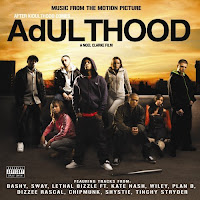 I feel more confident with both the new and older softwares that we have had to use and overall am more able and confident with the production processes required to make a film and also feel that we have created a fairly professional response to the main task. The paperwork has also helped me gain a deeper understanding of the subject in general and also helped me understand the time and amount of detail required to be in the film production industry.I think that our production ‘Ranelagh Road fills a gap in the market as it is the first drama of its kind aimed at 16- 25’s that really tackles directly knife crime without focus on drug and alcohol culture as a main focal point and therefore I think it would be a success as the only other prodcution with a similar main focal theme has been 'Kidulthood which has been massively successful, allowing the procudtion of the sequal 'Adulthood' which tried to show how youths should reject this crime and gang culture, therefore trying to break the stereotypes and change the ideolgies held within our society about urban areas and gang culture amongst youths.
I feel more confident with both the new and older softwares that we have had to use and overall am more able and confident with the production processes required to make a film and also feel that we have created a fairly professional response to the main task. The paperwork has also helped me gain a deeper understanding of the subject in general and also helped me understand the time and amount of detail required to be in the film production industry.I think that our production ‘Ranelagh Road fills a gap in the market as it is the first drama of its kind aimed at 16- 25’s that really tackles directly knife crime without focus on drug and alcohol culture as a main focal point and therefore I think it would be a success as the only other prodcution with a similar main focal theme has been 'Kidulthood which has been massively successful, allowing the procudtion of the sequal 'Adulthood' which tried to show how youths should reject this crime and gang culture, therefore trying to break the stereotypes and change the ideolgies held within our society about urban areas and gang culture amongst youths.
No comments:
Post a Comment